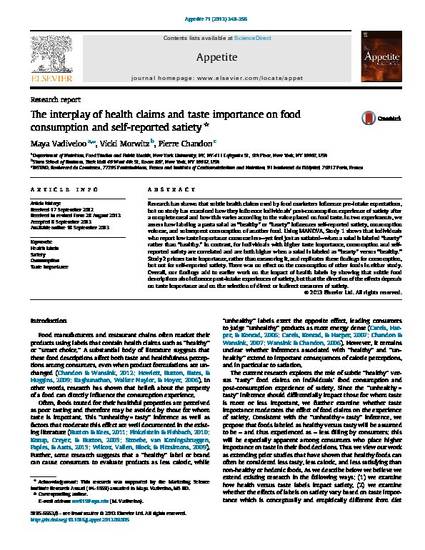
Article
The Interplay of Health Claims and Taste Importance on Food Consumption and Self-Reported Satiety.pdf
Appetite
(2013)
Abstract
Research has shown that subtle health claims used by food marketers influence pre-intake expectations,
but no study has examined how they influence individuals’ post-consumption experience of satiety after
a complete meal and how this varies according to the value placed on food taste. In two experiments, we
assess how labeling a pasta salad as ‘‘healthy’’ or ‘‘hearty’’ influences self-reported satiety, consumption
volume, and subsequent consumption of another food. Using MANOVA, Study 1 shows that individuals
who report low taste importance consume less—yet feel just as satiated—when a salad is labeled ‘‘hearty’’
rather than ‘‘healthy.’’ In contrast, for individuals with higher taste importance, consumption and selfreported
satiety are correlated and are both higher when a salad is labeled as ‘‘hearty’’ versus ‘‘healthy.’’
Study 2 primes taste importance, rather than measuring it, and replicates these findings for consumption,
but not for self-reported satiety. There was no effect on the consumption of other foods in either study.
Overall, our findings add to earlier work on the impact of health labels by showing that subtle food
descriptions also influence post-intake experiences of satiety, but that the direction of the effects depends
on taste importance and on the selection of direct or indirect measures of satiety.
Keywords
- Health labes,
- Satiety,
- Consumption,
- Taste importance
Disciplines
Publication Date
2013
DOI
http://dx.doi.org/10.1016/j.appet.2013.09.005
Citation Information
Maya Vadiveloo, Vicki Morwitz and Pierre Chandon. "The Interplay of Health Claims and Taste Importance on Food Consumption and Self-Reported Satiety.pdf" Appetite Vol. 71 (2013) p. 349 - 356 ISSN: 0195-6663 Available at: http://works.bepress.com/maya-vadiveloo/13/
